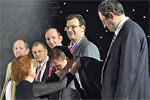


ChessBase 17 - Mega package - Edition 2024
It is the program of choice for anyone who loves the game and wants to know more about it. Start your personal success story with ChessBase and enjoy the game even more.

Jews are astoundingly over-represented in the pantheon of world chess greats, and today’s Israel is no chess-playing minnow. But on paper, the Jewish state could not reasonably have been expected to get near the medal podium at either Dresden, Germany 2008 or Khanty-Mansiysk, Russia 2010. Instead, it is the only country to have won a medal at both events – coming third to Ukraine, with Russia in second, this time, and losing out to Armenia, with the US in third place, two years ago.

The bronze medal team from Israel in Khanty-Mansiysk, with Ilia Smirin,
Captain Alon
Greenfeld, Victor Mikhalevski, Emil Sutovsky, Maxim Rodshtein and Boris Gelfand
Israel really shouldn’t have had a chance, especially after, early in the tournament, it could only tie with the relatively weak Indonesians and then lost to host Russia’s third side. But the fantastic collective spirit pulled the team through, said Alon Greenfeld, the non-playing captain of the Israel team. And a constructive “collective spirit” in chess, which is an utterly individual sport, he elaborated, is a rare and precious commodity indeed. There was an almost “euphoric” readiness to give everything for the team in Russia, Greenfeld exalted, an all-for-one and one-for-all mindset that saw Israel reel off an improbable sequence of five straight victories, several against very strong nations like Holland, Hungary and the US, to claim the bronze spot.
Local headlines from the tournament focused largely on Yemen’s refusal to play against Israel – a no-show that gave the team an automatic first round victory. That early unearned win didn’t particularly help; it meant the players had no easy match in which to get acclimatized. Far more worryingly, it exposed the ongoing anti-Israeli politics that the international chess authorities allow to afflict the sport, he said – a virus that reached its height in 2004, when the authorities selected Libya to host the individual world championships and, entirely predictably but utterly disgracefully, Israel players were unable to participate.
He’s even more upset, though, by his inability to make headway, either, in combating what he sees as the inadequate way Israel handles its chess players – unique assets who, he says, have over the years won more medals and championships for the country than any other sport, and yet who are given desultory levels of funding. Increasingly, he says, the top players are resorting to coaching, usually overseas, in order to support themselves. Three of the five Olympiad stars are now headed in that direction. And he won’t be able to pick them, by definition, he says, if their main focus is on helping others rather than playing and improving their own game.
His solution: The nation’s top ten or so players should be paid a moderate salary, which would include an obligation to make themselves available for international team tournaments. It’s an enviable opening gambit by an astute chess tactician, but Greenfeld has been around for long enough on the local chess scene to know he has little chance of winning this particular game.
...
HOW IS it, I ask Greenfeld, that Israel is a major player on the world chess stage in the first place? Is it, I venture, some kind of Jewish thing? Well, kind of… The sabra former champion initially offers a one-word answer: aliya. Which he then expands to a six word answer: Aliya from the former Soviet Union.
Throughout the past decade, in all team competitions, Israel has been in or around the top ten, he says, and that’s despite what the state gives to chess. Before the aliya wave, Israel also ranked somewhere between seven and 11, but the world field was weaker in those days; for one thing, there was just a single Soviet Union, whereas now it has split up into at least seven chess powers.
Israel’s entire team at the Olympiad in Russia was made up of immigrants. And by the way, he adds, most of the players in the US team are of Soviet background too. The Ukrainian team that won just now? Two Jews. The Russian team? Greenfeld knows of one Jew, for sure, and thinks there could be another.
Look back into chess history and Jews are everywhere. “Jews were very dominant until the 60s and 70s,” he says. Incredibly, staggeringly dominant, actually. Of the sport’s first eight official world champions, from 1886 to 1961, a dazzling four were Jewish: Wilhelm Steinitz (the Pragueborn “father of modern chess” and first official world champion), Emanuel Lasker (his Prussian successor who held the title for a still unrivaled 27 years), Mikhail Botvinnik and Mikhail Tal. And that quartet were the kings of the world for about 50 of those 75 years. Since then, we’ve also had Fischer – though he denied his Jewishness – and Garry Kasparov, who held the title from 1985 to 2000 and is still widely regarded as the greatest ever player. “As in other fields, in the Diaspora, they had to excel to succeed,” posits Greenfeld. “It’s the same in music, of course.”
But that overwhelmingly, absurdly disproportionate dominance suggests there must be something more to the phenomenon, something about chess itself that resonates particularly with the Jews, with the Jewish condition? Greenfeld doesn’t really think so. “If so, it’s very deep,” he offers after a long pause. “Most of the [top Israeli] players don’t have a real connection to Judaism – not knowledge, not observance. If it’s something genetic? I don’t know.”
Nations ranked by the average rating of top ten players + top twenty Israelis
|
|
Source: FIDE